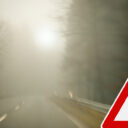Night Driving Safety Tips
Night driving hazards. Did you know according to the National Highway Traffic Safety Administration (NTSA) road fatalities triple during the night? Because you see less road ahead, there is less time to stop.
Night vision is the ability to see well in low-light conditions. As we age, we have greater difficulty seeing at night. Did you know that 9 of every 10 decisions you make behind the wheel are based on what you see? A 50-year-old driver may need twice as much light to see as well as a 30-year-old. At age 60 and older, driving can become even more difficult, according to the American Optometric Association. If night driving is challenging, you aren’t alone – millions of Americans feel the same way.
Driving becomes more difficult as we age because the cornea and lens in the eye become less clear causing light to scatter inside the eye, which increases glare. These changes also reduce contrast sensitivity — the ability to discern subtle differences in brightness — making it harder to see objects on the roadway at night.
We can’t change the aging process so what steps can be taken to ensure safe nighttime driving?
Protect your vision – One of the most damaging things to the eyes is being exposed to bright sunlight without protection. The more often your eyes must adjust to bright sunlight, the harder time they will have adjusting to the darkness. Always wear sunglasses when outdoors and reduce the brightness of your computer screen or phone, especially in a dark room.
Diet plays a role in helping your night vision and furthermore for your overall health. Eating foods rich in Vitamin A can help night vision and also protect the eyes from cataract formation, which is one of the most common causes of night blindness. Vitamin A-rich foods include dark green leafy vegetables, carrots, potatoes, dairy products, broccoli, squash, and fish.
Driver fatigue is prevalent between midnight and 6 am. Be extra vigilant during that time for tired drivers and becoming sleepy yourself. Roll down the window, play music, or stop for a cup of coffee.
Dirty or damaged windshields can scatter light and potentially increase the effects of glare, according to NHTSA. Newspaper and Windex are a great combination for your windshield. The group also reports that dirty or damaged headlights can decrease your visibility and cast glare onto oncoming drivers. So clean headlights and windshields regularly; you can use a special cleaning kit for headlights.
Collisions with deer often happen at dusk or at night and are more common from October to January. Your high beams can help you spot an animal’s glowing eyes. Nocturnal animals such as raccoons and possums are often seen scurrying across the road. When you see them, the safest way to avoid an accident is by slowing down and stopping—not by swerving.
Glasses—prescription or otherwise—add another reflective surface between the driver’s eyes and the road, so choosing the correct glasses to wear is crucial to improved nighttime visibility. The best option? Prescription lenses with anti-reflective coating. This coating stops additional, unnecessary light from reflecting inside your lenses while allowing more light to pass through.
Many different things may cause trouble in seeing at night. It can be as simple as needing a new eyeglass prescription, lacking vitamins, overexposure to the sun, or the presence of cataracts. If you find that you are having trouble seeing at night, contact your eye doctor who can help to rule out diseases that could cause long term loss of vision.
Be proactive in taking care of your health and be safe on the road. Be honest with yourself. If a driving situation makes you uncomfortable, don’t do it. Many older drivers voluntarily begin to make changes in their driving practices. If fast-moving traffic bothers you, consider staying off freeways, highways, and find street routes instead. You may also decide to avoid driving in bad weather (rain, thunderstorms, snow, hail, ice). If you are going to a place that is unfamiliar to you, it is a good idea to plan your route before you leave so that you feel more confident and avoid getting lost.
You can have the cleanest windshield and the best headlights, but they do nothing if your eyes are strained and they can’t correctly perceive road objects or other dangerous hazards. If friends or relatives are concerned about your driving ability – it may be time to take a hard look at your safety and the safety of others.
About Bissell Eye Care: John D. Bissell, OD owns and operates Bissell Eye Care servicing Northern Pittsburgh and Alle-Kiski Valley regions. With two locations to treat patients, we offer evening and Saturday appointments. Bissell Eye Care provides comprehensive eye examinations for the entire family beginning as early as 6 months, ocular disease detection and treatment, eyeglasses, sunglasses, activewear, contact lenses, and low vision examinations for those with significant vision loss. We accept most types of vision and health insurance plans. For more information, visit bisselleyecare.com or call our Bakerstown Office at 724-443-6767 or Natrona Heights office at 724-226-0444.

